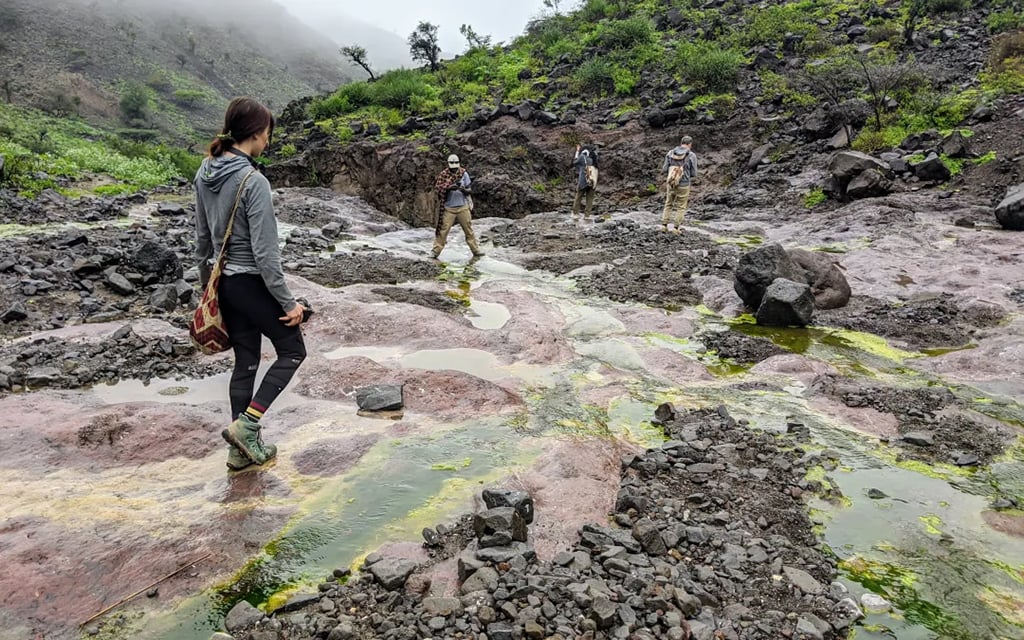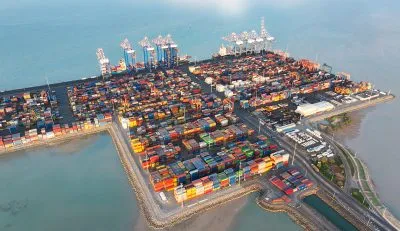When he returned to Djibouti in 2019 after 14 years in Benin, entrepreneur Yacoub Aden Miguil rediscovered a country of breathtaking natural wealth. For a year, he travelled the length and breadth of the country, from Lake Assal, Africa’s lowest point and the most saline water in the continent, to the coral reefs and spectacular sea life near Tadjourah, one of the oldest cities in the country and itself of historic significance, via the Day Forest and the Seven Brothers archipelago.
From this tour across the country he was convinced that Djibouti’s tourism potential had hardly been developed. This inspired him to produce Dalmar, an application connecting tourists, hoteliers, restauranteurs and local guides, helping to lay the foundations for a viable tourist ecosystem.
At the end of 2023 his project received a presidential award of $16,000, proof of the growing interest of the authorities in the sector.
While this was an encouraging initiative and Djibouti holds a treasure trove of delights for the tourist in search of new and authentic discoveries, it’s a gem in rough and unpolished form. It’s a work in progress in terms of the planning and development of tourist sites and in training the key personnel in the sector.
Tourism has become a government priority and is a major plank in its strategy to diversify the economy from over reliance on its port activities.
Osman Abdi Mohamed, director general of the National Tourism Agency, says that arrivals of 100,072 in 2024 (up to September) show a positive trend. The stated target of 200,000 annual visitors by 2030 seems achievable.
Today, tourism represents only 3% of the country’s GDP, a figure below the African median. The government hopes to double that within a decade.
Tourism is also a good generator of jobs. The overall plan is to cater to business and leisure tourism by developing beach resorts and diving centres, as well as ecological tourism, which will focus on discovering Djibouti’s archaeological and prehistoric sites.
The marketing strategy is aiming to place “Destination Djibouti” on the international calendar. To help attract more visitors, the price of an entry visa for Djibouti has been reduced from $80 to $12 for tourists and business travellers and a simplified online system has been instituted.
Natural sites will be promoted. Djibouti has a number of UNESCO World Heritage sites, including Lake Abbe and Lake Assal, Day Forest National Park, the Bronze Age burial tumuli or awellos, and the Abourma cave paintings.
At the same time, the hotel sector has boomed. Djibouti City now has 40 establishments, compared with 32 in 2018.
New high-end hotels have opened, such as the Escale International Hotel (150 rooms), the Djibouti Ayla Grand Hotel (217 rooms, built by Abu Dhabi group Nayel & Bin Harmal) and the Best Western Premier (64 rooms, near the old town).
“This expansion is a testament to the efforts made in developing the tourism sector and the investments made in the city’s hotel infrastructure,” says Osman Abdi Mohamed.
Several new projects have been announced: the transformation of part of the Moucha and Maskali islands into an integrated tourist complex, with a first phase having $1bn of foreign direct investment; the development of the Day complex for ecotourism enthusiasts; and the renovation of Djibouti’s old port to make it an attractive centre combining shops, leisure activities and cultural heritage.
Adventure and culture promotred
Djibouti is also developing its ecological and adventure tourism brand, with local initiatives promoting emblematic natural sites.
In the Grand Bara desert, sand yachting has been revived to attract customers in search of thrills. The Dikhil region offers a more immersive tourist experience, combining accommodation in the heart of nature and discovery of the surrounding landscapes.
Djibouti – at the crossroads of Arab, African and European influences – is also looking to promote its cultural heritage. The historic centre of the capital, with its colonial buildings and lively markets, is an asset, but is still not very integrated into the tourist circuit.
Several projects aim to rehabilitate and enhance the attractiveness of the old town. “Tourism should not be limited to landscapes, it should also tell a story,” says one industry player, convinced that this cultural dimension can become a real attraction for visitors.
Business tourism, which is better developed than leisure tourism, is enjoying solid momentum. This is being driven by foreign military bases and major logistics projects that make Djibouti a strategic crossroads.
While the country already welcomes a significant flow of military personnel, diplomats, financiers, airline crew and government delegations, their contribution to leisure tourism could be more substantial. Consideration is being given to encouraging these foreign professionals to extend their stay beyond their official missions.
Refining the tourism project
One of the main obstacles to the development of tourism remains the lack of accommodation outside the capital. With the exception of the Gadileh Resort Hotel in Tadjourah, which was opened in 2020 with 60 rooms and built by a Djiboutian businessman, hotel infrastructure in the regions remains limited.
Another major obstacle is the prohibitive cost of air tickets. To remedy this, Air Djibouti is trying to organise a viable offer. “Without a strong national airline, a country cannot develop its tourism,” insists Abdourahman Ali Abdillahi, CEO of Air Djibouti.
Founded in 1963 and relaunched in 2015, the airline aims to expand its regional network. In particular, it is relying on propeller planes to connect Tadjourah, Obock and the Moucha Islands, with the aim of opening up these destinations and facilitating access to the country’s natural sites.
In addition, the Flynasairline launched a link with Saudi Arabia in 2024, strengthening the strategic axis with the Gulf. A new international airport is also in the pipeline, marking a fresh stage in the country’s opening up.
The private sector plays a key role in this tourism drive. While entrepreneurs like Yacoub Aden Miguil are striving to structure the digital offering, others, such as Houssein Mahamoud Robleh, director of the Kamaj group, are banking on upmarket hotels to attract an international clientele.
In 2020 he signed a partnership with Accor to modernise his hotels. At the same time, he is investing in infrastructure at natural sites such as Lake Abbe and Maskali Island, off the coast of the capital. Robleh is convinced that tourism can help develop the country’s regions and better redistribute wealth: “Jobs must be created because the unemployment rate is high, especially among young people. There is much to be done, particularly in terms of road infrastructure, as we are in a country that is still untouched.”
Djibouti still has to overcome several obstacles to establish itself as a competitive destination. High prices form one of them. At present, staying in a five-star hotel in Djibouti is often more expensive than in Abu Dhabi, the capital of the United Arab Emirates, for example.
“To develop leisure tourism, we will need to reduce costs, lower the price of air travel and accelerate investment in infrastructure,”says Nicolas Froger, director of the Djibouti Palace Kempinski.
He also points to a glaring lack of services at certain tourist sites: “A tourist visiting Lake Assal or Lake Abbé will find no showers, no refreshment stands, no agencies offering guided excursions. We need to structure what we offer if we want to attract an international audience.”
Faced with these challenges, some are calling for a more targeted regional strategy. “Attracting Americans or French people here is complicated. We need to sell Djibouti as a destination for long weekends to travellers from Doha, Dubai, Addis Ababa and Nairobi,” suggests one expert.
To expand internationally, the government will also have to step up the promotion of the country abroad. “Among the challenges identified, international promotion efforts must be intensified to increase Djibouti’s visibility,” says Osman Abdi Mohamed, director general of the National Tourism Agency. “This requires targeted marketing strategies and appropriate training to guarantee a quality tourist experience.”
With its turquoise waters, exceptional sea life – including whale sharks that pass through for several months of the year – and unspoilt nature, Djibouti has serious assets to become a major tourist hub in the Horn of Africa. But to turn this potential into success, the country will still have to overcome its structural challenges, improve accessibility and refine its offering in order to attract an international clientele.
Want to continue reading? Subscribe today.
You've read all your free articles for this month! Subscribe now to enjoy full access to our content.
Digital Monthly
£8.00 / month
Receive full unlimited access to our articles, opinions, podcasts and more.
Digital Yearly
£70.00 / year
Our best value offer - save £26 and gain access to all of our digital content for an entire year!

 Sign in with Google
Sign in with Google 



